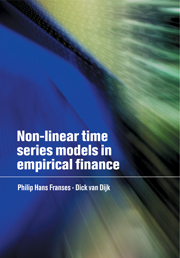6 - Conclusions
Published online by Cambridge University Press: 14 May 2010
Summary
In this book we discussed nonlinear time series models for financial asset returns, which can be used for generating out-of-sample forecasts for returns and volatility. The reason for considering nonlinear models is the observation that many financial time series display typical nonlinear characteristics, as documented in chapters 1 and 2. Important examples of those features are the occasional presence of (sequences of) aberrant observations and the possible existence of regimes within which returns and volatility display different dynamic behaviour. Through an extensive forecasting experiment (for a wide range of daily data on stock markets and exchange rates), we also demonstrated that linear time series models do not yield reliable forecasts. Of course, this does not automatically imply that nonlinear time series models do but, as we argued in this book, it is worth a try. As there is a host of possible nonlinear time series models, we decided to review in chapters 3, 4 and 5, the (what we believe to be) currently most relevant ones and the ones that are most likely to persist as practical descriptive and forecasting devices.
In chapter 3, we discussed several regime-switching models such as the self-exciting threshold model, the smooth transition model and the Markov-Switching model. In this chapter we confined the analysis to the returns on financial assets, although they can also be considered for measures of risk (or volatility) like squared or absolute returns.
- Type
- Chapter
- Information
- Non-Linear Time Series Models in Empirical Finance , pp. 251 - 253Publisher: Cambridge University PressPrint publication year: 2000



